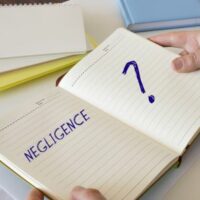Proving Negligence In A Georgia Personal Injury Claim

After suffering an injury in Georgia because of another person’s negligence, you have the right to file a personal injury claim and recover compensation for your injuries. But what exactly is the definition of “negligence” under Georgia law? What elements do you need to prove to succeed in a Georgia negligence action? The following is a look at how to prove negligence in a Georgia personal injury claim.
How To Prove Negligence in a Georgia Personal Injury Claim
A claimant must establish four elements to successfully pursue a negligence claim. These four elements are;
- A duty of care
- A breach of duty
- Causation
- Damages
A Duty of Care
Firstly, to succeed in a Georgia negligence action, you must prove that the defendant owed you a legal duty to conform to a particular standard of conduct for your protection. Usually, the standard of care is determined by the applicable standard of care. For example, as it pertains to drivers, all drivers owe other road users a duty to keep safe distances between their vehicles. And as it pertains to property owners, they must keep their premises free of any hidden dangers.
A Breach of Duty
Second, in a Georgia negligence case, you must prove that the defendant failed to meet the applicable standard of care. There are different ways you can demonstrate a breach of duty. For example, in the case of the driver, they might have failed to maintain a safe distance between your vehicle and theirs because of distracted driving. In the property owner’s case, they might have failed to put a warning sign next to a broken staircase.
Causation
After demonstrating a duty of care and breach of that duty, you must show that the defendant’s negligent conduct caused your injuries. In a Georgia personal injury case, you are required to prove two types of causation: actual cause and proximate cause. Proving actual cause entails showing that, but for the defendant’s negligence conduct, your injuries would not have occurred. Proving proximate cause involves showing that your injuries were a reasonably foreseeable consequence of the defendant’s conduct—i.e., the injuries are not too attenuated from the defendant’s negligence.
Damages
Lastly, you must prove damages to succeed in your Georgia personal injury claim. Proving damages in a Georgia personal injury case involves proving economic and non-economic damages. Some of the damages that you might be eligible for in a Georgia personal injury claim include:
- Past and future medical expenses
- Lost wages
- Future lost earning potential
- Pain and suffering
- Property damage
- Mental anguish
Generally, there are no damages caps on personal injury settlements or judgments in the state of Georgia.
Contact an Atlanta Personal Injury Attorney
If you or a loved one suffered injuries because of another party’s negligence, you deserve to be fairly compensated. An Atlanta personal injury attorney at Carroll Law Firm can help you recover the compensation you deserve. Call us today at 404-816-4555 to schedule a consultation.
Source:
law.cornell.edu/wex/tort
